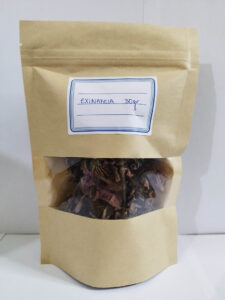What is echinacea?
Can a small purple flower boost our immune system and shield us against viruses and flu? Yes, it can and it is echinacea!
Echinacea, also known to many as echinacea, is an herb, specifically a small purple flower, that grows primarily in North and Western America and belongs to the larger sunflower family.
The main species are:
- Echinacea purpurea
- Echinacea purpurea,
- Echinacea angustifolia
- Echinacea angustifolia (Echinacea angustifolia)
- Echinacea asiatica asiatica (Echinacea asiatica asiatica asiatica) and Echinacea anginacea (Echinacea asiatica asiatica).
It is traditionally used as an analgesic herb to relieve bites and heal wounds and as an immunostimulant to treat infections.
Nowadays, it is also cultivated in Europe with the leaves, flower, root and stem of the plant being used for the production of food supplements.

Echinacea: benefits
This herb has been studied extensively. In summary, its actions – its properties are:
- Antiviral action
- Antifungal action
- Antibacterial action
- Stimulates the immune system
- Accelerates tissue healing
Strengthening the immune system
Echinacea does not treat the pathogen that caused the virus or infection, but it activates and strengthens the action of the immune system. In this way, bacteria and viruses do not develop a tolerance to its action, as is the case with common antibiotics. [2][3]
Many studies have shown that taking an echinacea supplement strengthens the immune system, shielding the body against pathogens.
More specifically, it appears to enhance the activity and production of immune system cells that are responsible for recognizing and eliminating pathogens.
- increases the activity of macrophages and necrosis factor (TNF-alpha) up to 30%
- even stimulates the production of white blood cells from the bone marrow (B and T-lymphocytes).
For this reason, one could reasonably say that echinacea is a natural immunostimulant.
- Accelerates recovery from the common cold, while significantly reducing its symptoms (e.g. sore throat, runny nose, stuffy nose, sneezing, headache and more)
- It contributes significantly to the treatment of viruses, as it helps increase the body’s resistance to viruses (herpes, flu virus, etc.)
- There is evidence that it can help prevent the onset of colds or flu when taken in the very early stages, however its use is not indicated as a preventative measure if there is no suspected disease.
Treatment of bacteria and fungi
Studies prove the effectiveness of using echinacea as a powerful antibacterial and antifungal dietary supplement, as it helps to treat bacteria and fungi responsible for urinary tract infections and skin infections, such as staphylococcus.
More specifically, it helps to treat the symptoms of urinary tract infections and irritable bladder, and is also indicated in cases of recurrent and recurrent fungal vaginitis, otitis media, tonsillitis or bronchitis.
Additional actions
It is an excellent antiseptic, which is why it is used locally on wounds or as a solution for gargling. It also has a healing effect.
Echinacea and autoimmune diseases
Its use is contraindicated in people with autoimmune diseases, in people taking immunosuppressive treatment, in those suffering from tuberculosis, in those allergic to daisies or to echinacea (a substance contained in the extract of the plant).






Reviews
There are no reviews yet.